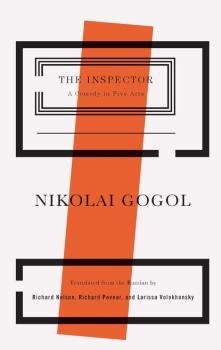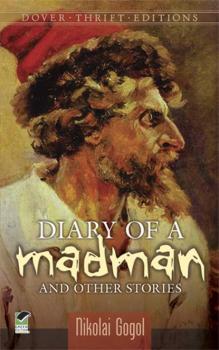ТОП просматриваемых книг сайта:
Николай Гоголь
Список книг автора Николай ГогольАннотация
A revelatory new translation of Gogol’s comedy by renowned playwright Richard Nelson and Richard Pevear & Larissa Volokhonsky – the foremost contemporary translators of classic Russian literature including the best-selling Oprah’s Book Club selection, Anna Karenina – marks the first of a series of translations of important Russian plays over the next ten years.
Информация о книге
Автор произведения Николай Гоголь
Аннотация
Gogol's stories are admired for their skillful mingling of fantasy and reality, quiet good humor and use of mundane details — as Gogol put it — «to extract the extraordinary from the ordinary.» Imaginative and timeless, they remain as fresh and significant today as they were to readers generations ago.This rich selection of four short stories by the great 19th-century Russian author of Dead Souls includes «The Nose,» a savage satire of incompetent bureaucrats and the snobbery and complacency of the Russian upper classes; «Old-Fashioned Farmers,» a sketch depicting an elderly couple who live a happy but simple life in rustic seclusion; «The Tale of How Ivan Ivanovich Quarrelled with Ivan Nikiforovich,» and of Gogol's most famous comic stories; and «The Overcoat,» an exceptionally moving tale — considered a masterpiece of the form — about a poor and much-ridiculed St. Petersburg official. Includes a selection from the Common Core State Standards Initiative: «The Nose.»
Информация о книге
Автор произведения Николай Гоголь
Жанр Зарубежная классика
Серия Dover Thrift Editions
Аннотация
A stranger arrives in a Russian backwater community with a bizarre proposition for the local landowners: cash for their «dead souls,» the serfs who have died in their service and for whom they must continue to pay taxes until the next census. The landowner receives a payment and a relief of his tax burden, and the stranger receives — what? Gogol's comic masterpiece offers the answer in a vast and satirical painting of the Russian panorama, as it traces the path and encounters of its mysterious protagonist, Pavel Ivanovich Chichikov, in pursuit of his dubious scheme.The plot of Dead Souls is reputed to have been inspired by an actual episode related to the author by his friend, the poet Pushkin. Although intended as a three-part novel, only the first part and a few fragments of a draft of the second part exist; Gogol completed and destroyed the second part, and died in the course of his ascetic preparations for writing the third. Some readers consider his novel a realistic portrait of nineteenth-century Russia; others regard it as a work of great symbolism, proclaiming the trickster Chichikov an accurate image of commercial travelers the world over, whose success rests less upon their actual wares than on their grasp of human nature and powers of persuasion. Among the greatest nineteenth-century Russian novels, Dead Souls continues to inspire twenty-first century authors and readers.
Информация о книге
Автор произведения Николай Гоголь
Жанр Зарубежная классика
Серия Dover Thrift Editions
Аннотация
Hailed by Nabokov as «the greatest artist that Russia has yet produced,» Nikolai Gogol (1809-1852) left his mark as a playwright, novelist, and writer of short stories. Gogol's works remain popular with both writers and readers, who prize his originality, imaginative gifts, and sheer exuberance.This collection offers an excellent introduction to the author's works. Opening a door to his bizarre world of broad comedy, fantasy, and social commentary, the title story portrays a petty official's mental disintegration as he struggles for the attention of the woman he loves. Set during the repressive rule of Nicholas I, it satirizes the bureaucratic excesses of the era. Additional tales include «The Nevski Prospect,» a portrayal of the feverish pace of St. Petersburg street life, and «The Portrait,» a gripping depiction of a soul's perdition.
Информация о книге
Автор произведения Николай Гоголь
Жанр Зарубежная классика
Серия Dover Thrift Editions
Аннотация
One of the most famous comedies in world theatre, Gogol's masterpiece has lost none of its bite. In a small town corruption is rife, and the Mayor and his cronies have got it made. So when they learn they are going to be subject to an undercover government inspection they panic. Mistaking a penniless nobody for the inspector they swiftly fall victims to their own stupidity and greed.A dazzling blend of preposterous characters and familiar situations, Nabokov called The Government Inspector the greatest play in the Russian language. A production of this version of the play opened at the Chichester Festival in June 2005 starring the comedian Alistair McGowan.
Аннотация
Nikolai Gogol, an early 19th century Ukrainian-born Russian novelist, humorist, and dramatist, created some of the most important works of world literature and is considered the father of modern Russian realism. Gogol satirized the corrupt bureaucracy of the Russian Empire through the scrupulous and scathing realism of his writing, which would ultimately lead to his exile. Among some of his finest works are his short stories. Together in this collection are collected some of the best of these stories, they include the following: Old Fashioned Farmers, How the Two Ivans Quarrelled, The Nose, The Overcoat (The Cloak), St. John's Eve, The Night of Christmas Eve, and The Mantle.
Аннотация
Nikolai Gogol, an early 19th century Ukrainian-born Russian novelist, humorist, and dramatist, created some of the most important works of world literature and is considered the father of modern Russian realism. Gogol satirized the corrupt bureaucracy of the Russian Empire through the scrupulous and scathing realism of his writing, which would ultimately lead to his exile. Among some of his finest works are his short stories. Together in this collection are collected some of the best of these stories, they include the following: The Diary of a Madman, The Viy, The Mysterious Portrait, The Fair of Sorotchinetz, An Evening in May, Mid-Summer Evening, and The Carriage (The Calash).
Аннотация
Три киевских студента-семинариста отправились на каникулы, решив немного подзаработать репетиторством. Да вот незадача – заплутали по дороге и вынуждены были попроситься на ночлег к старухе на одном из отдаленных хуторов. Хоме Бруту пришлось устраиваться на ночлег в хлеву. К ужасу бурсака, в тот самый момент, когда он готовился ко сну, к нему явилась хозяйка, оказавшаяся ведьмой. Она вскочила на него верхом и погнала его по полям и буеракам. Только беспрерывное чтение молитв помогло Хоме избавиться от ведьмы и когда к утру чары ее развеялись, она в полном изнеможении упала на землю и превратилась в прекрасную девушку. После всего пережитого, бурсак решил, что лучше будет ему вернуться в Киев и провести остаток каникул в общежитии семинарии. Но через несколько дней ректор приказал ему отправиться к богатому сотнику, чтобы прочитать молитвы над его скончавшейся красавицей-дочерью. Оказавшись на месте и взглянув в лицо покойной, юноша убедился, что это та самая паночка-ведьма, с которой он уже имел несчастье повстречаться ранее. Так же не пропустите ранее вышедшие аудиокниги Н.В. Гоголя: «Вечера на хуторе близ Диканьки», «Мертвые души», «Ревизор», «Вий», «Тарас Бульба», «Портрет», «Коляска», «Шинель», «Нос». Исполняет: Александр Клюквин ©&℗ ИП Воробьев В.А. ©&℗ ИД СОЮЗ
Аннотация
Пульхерия Ивановна и Афанасий Иванович всю жизнь прожили душа в душу, трогательно и нежно заботясь друг о друге. Детей у стариков не было, поэтому всю свою нерастраченную любовь и ласку они дарили друг другу и окружающим. Но однажды случилось непоправимое. Пульхерия Ивановна умерла и вместе с ней «умер» и ее некогда уютный дом и его одинокий престарелый хозяин. Так же не пропустите ранее вышедшие аудиокниги Н.В. Гоголя: «Вечера на хуторе близ Диканьки», «Мертвые души», «Ревизор», «Вий», «Тарас Бульба», «Портрет», «Нос», «Шинель», «Коляска». Исполняет: Александр Клюквин ©&℗ ИП Воробьев В.А. ©&℗ ИД СОЮЗ
Заколдованное место. Быль, рассказанная дьячком ***ской церкви - Николай Гоголь
Вечера на хуторе близ ДиканькиАннотация
«Ей-богу, уже надоело рассказывать! Да что вы думаете? Право, скучно: рассказывай, да и рассказывай, и отвязаться нельзя! Ну, извольте, я расскажу, только, ей-ей, в последний раз. Да, вот вы говорили насчет того, что человек может совладать, как говорят, с нечистым духом. Оно конечно, то есть, если хорошенько подумать, бывают на свете всякие случаи… Однако ж не говорите этого. Захочет обморочить дьявольская сила, то обморочит; ей-богу, обморочит! Вот извольте видеть: нас всех у отца было четверо. Я тогда был еще дурень. Всего мне было лет одиннадцать; так нет же, не одиннадцать: я помню как теперь, когда раз побежал было на четвереньках и стал лаять по-собачьи, батько закричал на меня, покачав головою: „Эй, Фома, Фома! тебя женить пора, а ты дуреешь, как молодой лошак!“ Дед был еще тогда жив и на ноги – пусть ему легко икнется на том свете – довольно крепок. Бывало, вздумает…»










